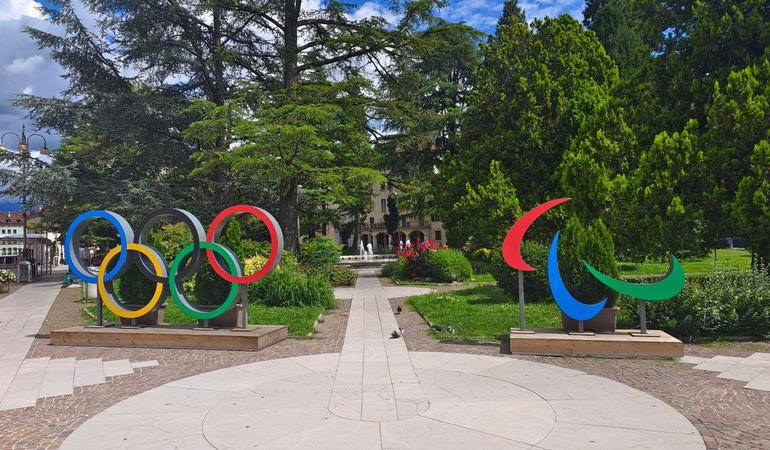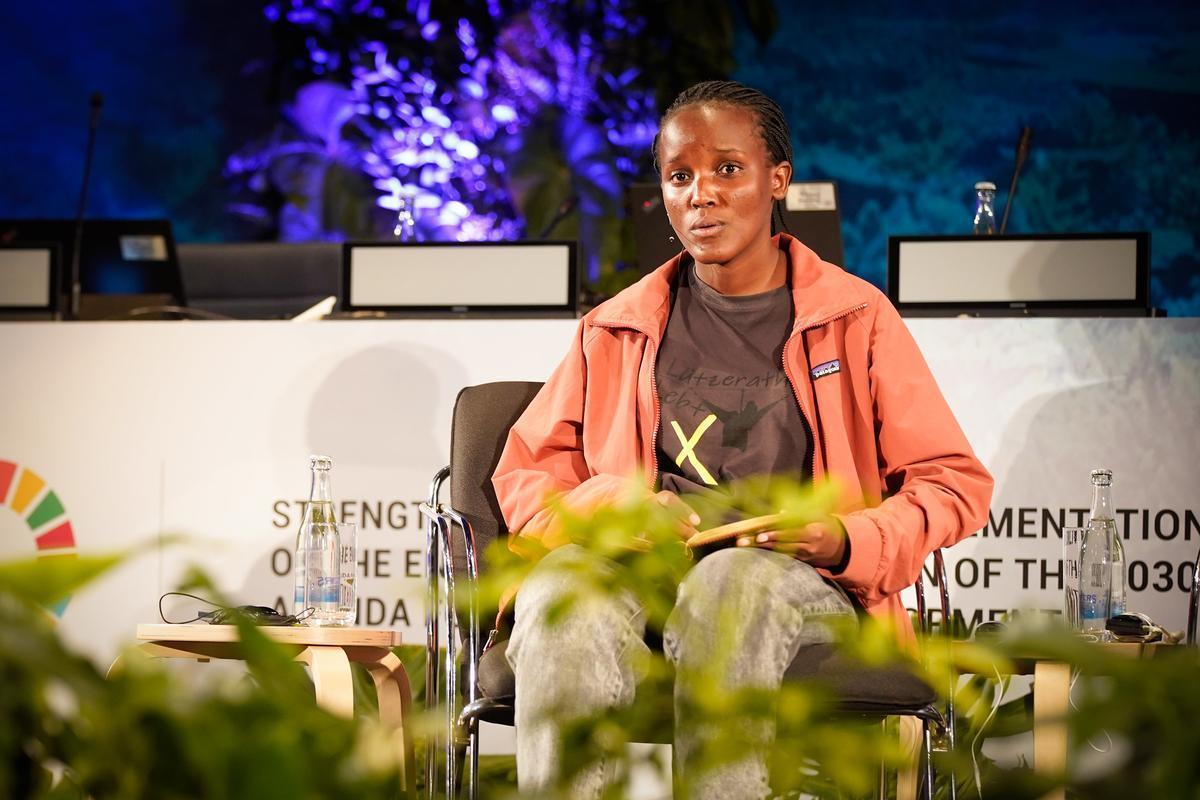
Milano-Cortina. Ecco come verranno spesi i 450 milioni di euro delle paralimpiadi



21 giugno 2024
A continent devastated by the climate crisis, but still left off the discussion tables when it comes to resources and new projects. As was the case with the Mattei Plan or the G7 proposals on climate and environment. For Vanessa Nakate, Ugandan activist and one of the best known faces of the Fridays for Future movement, "Italy must not make plans for the African continent. We must stop thinking of Africa as a state, when in fact it is a territory that hosts 54 countries. How can one nation decide for 54? It is unacceptable'. On the repercussions of climate change, he emphasised how extreme events and unlivable situations, from desertification to floods, have devastating effects on many aspects of people's lives, from health to education and the economy. Speaking on 18 May at the Peace Arena in front of Pope Francis, she is convinced that reflections on protecting the world and political stability cannot be separated.
The triple injustice against the Global South
Nakate, why were you present at the Arena di Pace in Verona and what impression did you have of that day?
I attended the Arena di Pace because I understand the deep connection that exists between peace and the environment. In a way, efforts to build peace will never be successful if the effects of climate change continue to bend certain communities. Peace is not just the absence of war, it is much more. We have seenand know territories where resources have been plundered and violent confrontation has been the result. There are many causes, but one of the most important reasons is the fact that the Earth's resources are limited. We must always remember this when we talk about theinterconnection between peace and climate issues, because the two areas influence each other. The impression I got in Verona on 18 May was of a space where I could meet people who are really different from each other, but who are all working on a peace project, based on what they know. They inspired me and, thanks to this opportunity for dialogue, I was able to take my speech to the Pope. I believe that when we start talking about common issues, the church has a great responsibility as a spiritual leader, to push for the protection of creation: after all, I think that protecting nature was the first mission to which God called us.
What are the biggest challenges facing the African continent in the coming years?
With respect to environmental issues, first of all one must recognise that Africa is suffering many of the worst consequences of the climate crisis, despite the fact that it is responsible for only 4 per cent of historical emissions (i.e. those emitted by states from 1850 to the present day, ed). Many African countries are already suffering devastating impacts: I had the opportunity to meet communities in the Horn of Africa, with children suffering from severe malnutrition, because they have no access to food. Water is also in short supply because of the drought that threatens millions of people with starvation. Then there are the floods, in the countries of the East, with cyclones in the south forcing those living in those territories to evacuate, destroying entire economies. As climate disasters continue to multiply, entire sectors will be disrupted. A few months ago in South Sudan, schools were closed because of 45-degree heat waves, while in Kenya, schools had to leave students at home because of torrential rains and floods. Today, recognising the climate crisis gives us the opportunity to identify related problems that we do not think about: not giving concrete answers destroys education, health, infrastructure, services. With very serious repercussions on the growth of the younger generations.
In Nigeria, Europe looks for oil and doesn't care about the environment
What is needed to tackle this problem?
In the short term, give more and more space to climate finance. For African nations to be able to adapt to the climate crisis, no matter how much we talk about the need to finance loss and damage (the loss and damage fund, which saw at the last Cop the start of appropriations by the host country, the United Arab Emirates, ed), if there is no finance for adaptation, there will be even more loss and damage.
The Eacop project is one of the extractive infrastructures being built on the African continent. What is the status of the implementation process and what consequences are citizens being kept in the dark about?
I have not personally gone to the territories where Eacop will be built, but I have been involved in advocacy to ask leaders what their development strategy is, especially in my country, Uganda. They often tell us: 'We need this plant because it brings development. We need it for jobs and for our communities'. But then if we go and see what the development of fossil gas extraction has brought to the African continent, we see that it has certainly not helped the 600 million people in sub-Saharan Africa who still do not have access to electricity. We believe that real progress lies in citizens having very fair access to renewable energy, leaving no one behind. But one thing is certain: it will be difficult for countries like Uganda to stop such investments if the demand for drilling and climate-changing gases from the countries of the global North continues. That is why it is necessary that those who have benefited for more than a century from extractivism now begin to set an example by abandoning this type of fuel for good.
At the last G7 meeting on Climate and Environment held in Italy (Turin, 28-30 April), the word 'Africa' appeared several times in the final document, but no country from the continent was present at the discussion table. What do you think of this choice?
We have seen several times discussions that concerned resources or territories of the African continent without any representation of the states that compose it. And it is, even on a historical level, a very problematic point, starting from the partition of the continent to its devastation. That is why we are pushing for an Africa Climate Summit, a space where African solutions are discussed, proposed by African people, because there are no ways to give answers to the climate crisis without involving those who must become protagonists of their own development.
What is your impression of the Italian government's plan for Africa, the so-called 'Mattei Plan'?
I don't have much information about it. The only thing I can say is that we are getting into a situation that repeats the mistakes of the past. Italy should not make plans for the African continent. We must stop thinking of Africa as a state, when in fact it is a territory that is home to 54 countries. How can one nation decide for 54? It is unacceptable: we have the wisdom, intelligence and skills to build our future, to decide which world we want to inhabit.
In Europe, climate campaigners are increasingly being criminalised. How is the situation evolving, from your point of view?
We are noticing, and not only in Europe, how activists and defenders of the environment are being attacked, just as members of indigenous communities sometimes even lose their lives. Even in my country, those who protest against projects like Eacop are arrested and it is hard to understand how those who fight to make the world a more liveable place for all risk more than those who are making it die. There is no business on a dead planet.
In Italy politicians want to punish environmentalists with disproportionate sentences
How difficult is it for you to carry out this frontline commitment?
I feel a lot of expectations and it is not easy to manage them sometimes. Ithas helped me a lot to know that, from my position, I can reach a lot of people through the media and events. Another aspect that reassures me is knowing that I am not alone: Fridays for Future is a global movement, so I realise that I am no different from many of my fellow activists. This helps me to keep my feet on the ground and realise that we are all needed and play our part in communicating the urgency of the climate crisis: those who strike, those who hold placards, those who ring the bells, those who prepare food for everyone, those who offer water to those who are demonstrating. In a way, the movement cannot exist without individuals to support it.
What is one goal you would like to see achieved in 10 years?
It is impossible to speak for the whole movement. What Fridays for future has done over the past five years has enabled thousands and thousands of people to learn about and mobilise against the climate crisis. But to keep repeating that this problem exists and that's enough can become frustrating. We need action, we need to question ourselves, we need to raise our voices and keep talking. I hope that the coming years can be a time of renewal, in which new young activists grow up believing in what we have started to build. Those who were part of the movement in the early years are now adults, and it is for this reason that those who have experienced these years will help those who are now approaching climate protest to grow.
Do international contexts like the Climate Conferences (COP) still make sense?
We need the strength of the people but also moments, such as the COPs, where the opportunity is taken to put ambitions on paper, which states commit to respect. There are many actors participating, from activists from the countries most affected by climate change to ministers of states to businessmen from large multinational fossil fuel companies. Each of them has different interests, but we have to be present, to make the pressure of millions of people who want to be represented felt: that is why having a delegation there is crucial. We have to show up and ask uncomfortable questions, demand accountability for broken promises and demand a fair transition. Fight for climate justice.
La tua donazione ci servirà a mantenere il sito accessibile a tutti
La tua donazione ci servirà a mantenere il sito accessibile a tutti